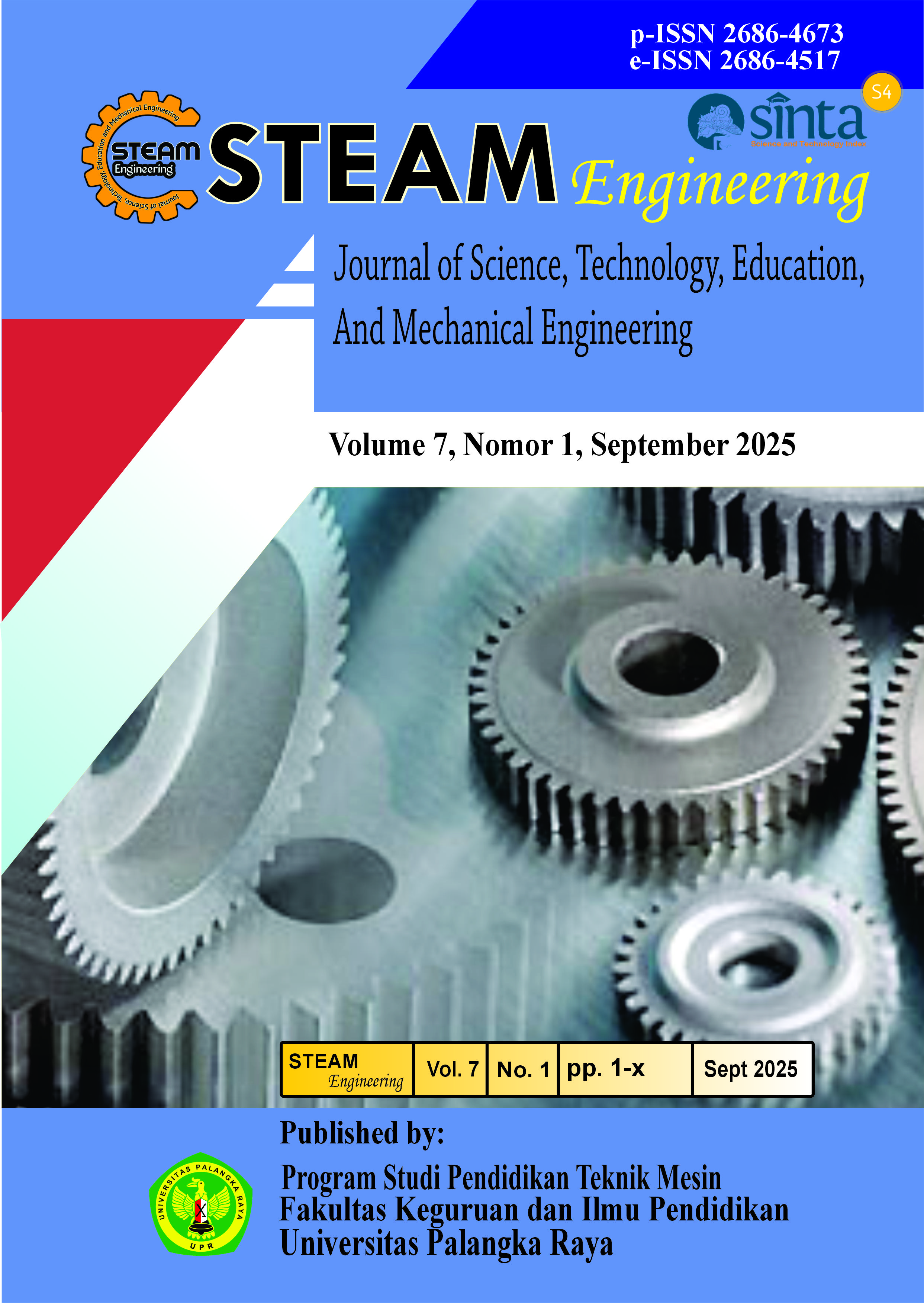TRANSFORMASI TEACHING FACTORY MELALUI INTEGRASI KEARIFAN LOKAL DI PENDIDIKAN VOKASI INDONESIA: DARI REPLIKASI INDUSTRI KE INKUBASI BUDAYA
DOI:
https://doi.org/10.37304/jptm.v7i1.22900Keywords:
Teaching Factory, Local Wisdom, Vocational Education, Culture-Based Innovation, Educational TransformationAbstract
Vocational education in Indonesia has extensively adopted the Teaching Factory (Tefa) model as a primary strategy to meet the demands of the industry. However, this model, which focused on the replication of modern industrial processes, faces challenges in producing graduates who are grounded in the context of local wisdom. This approach risks fostering a skills mismatch and potentially producing graduates who are uprooted from their cultural context. This article argues that the integration of local wisdom can fundamentally transform Tefa, shifting its paradigm from mere industrial replication to an incubator for local wisdom-based innovation. The goal is to achieve a vocational education system that is both economically relevant and deeply rooted in national identity. Employing a narrative literature review, this study synthesizes academic literature to address the urgency, form, opportunities, and challenges of this transformation. The findings indicate that transforming Tefa is crucial for fostering contextual learning, preserving cultural heritage, and unlocking new competitive advantages. This transformation manifests at the conceptual, curricular and pedagogical, product innovation, and community partnership levels. The analysis highlights that this process turns Tefa into a creative ecosystem, yet it must navigate the crucial tension between authenticity and commercialization. This article concludes that positioning local wisdom at the core of Tefa is a strategic move toward achieving a vocational education that is not only economically relevant but also firmly rooted in national identity.
Downloads
References
Amri, U., Ganefri, G., & Hadiyanto, H. (2021). Perencana Pengembang Dan Pendidikan Berbasis Kearifan Lokal. EDUKATIF: Jurnal Ilmu Pendidikan, 3(5), 2025–2031. https://doi.org/10.31004/edukatif.v3i5.751
Disas, E. P. (2018). Link and Match sebagai Kebijakan Pendidikan Kejuruan. Jurnal Penelitian Pendidikan, 18(2), 231–242. https://doi.org/10.17509/jpp.v18i2.12965
Fahmayani, E. N. (2021). Pelaksanaan Link and Match 8+I di SMK Pusat Keunggulan SMKN 1 Dlingo. Prosiding Pendidikan Teknik Boga Busana. 16, 1 (Oct. 2021).
Fitrihana, N. (2019). Rancangan Pembelajaran Teaching Factory Di SMK Tata Busana. Home Economics Journal, 2(2), 56–64. https://doi.org/10.21831/hej.v2i2.23293
Hasbar, H., & Hanim, Z. (2025). Perencanaan Strategi Pendidikan Berbasis Potensi Lokal untuk Meningkatkan Kualitas Pemuda di Kalimantan Timur. Pendas Mahakam: Jurnal Pendidikan Dan Pembelajaran Sekolah Dasar, 10(1), 1–5.
He, J., & Wang, C. L. (2017). How Global Brands Incorporating Local Cultural Elements Increase Consumer Purchase Likelihood. International Marketing Review, 34(4), 463–479. https://doi.org/10.1108/imr-08-2014-0272
Indrawan, I. P. O., Sudirgayasa, I. G., Guru, P. G., & Denpasar, S. (2020). Integrasi Kearifan Lokal Bali di Dunia Pendidikan. Prosiding Seminar Nasional Webinar Nasional Universitas Mahasaraswati Denpasar, 189–194.
Iskandar, A. G. (2022). Optimalisasi Link and Match Melalui Revitalisasi Pendidikan Vokasi dan Pelatihan Vokasi. Jurnal Kewarganegaraan, 6(3), 4773–4792.
Islami, D. (2022). Peranan Kearifan Lokal Dalam Pendidikan Karakter. Diakses Dari: Https://Osf.Io/Preprints/Thesiscommons/3xezr_v1. https://doi.org/10.31237/osf.io/3xezr
Isnantyo, Pardjono, Triyono, M. B., & Minghat, A. D. (2024). Isnantyo, et., al. 2024. Indonesian Teaching Factory-The Recent Breakthrought in Education at Vocational High Schools. IJCEE-Indonesian of Journal Civil Engineering Education, 10(01), 57–67. https://doi.org/10.20961/ijcee.v10i1.94388
Kemendikbud. (2017). Strategi Implementasi Revitalisasi SMK (10 Langkah Revitalisasi SMK). Direktorat Pembinaan Sekolah Menengah Kejuruan.
Kemendikbud. (2019). Turbulensi Pendidikan Vokasi di Era Disrupsi 4.0. Direktorat Pembinaan Sekolah Menengah Kejuruan.
Kemendikbudristek. (2023). Panduan Teaching Factory Sekolah Menengah Kejuruan. Direktorat Sekolah Menengah Kejuruan.
Kemenparekraf. (2022). Rencana Strategis Kemenparekraf/Baparekraf 2020-2024. Kementerian Pariwisata dan Ekonomi Kreatif Republik Indonesia.
Komara, E., & Adiraharja, M. I. (2020). Integrasi Nilai-Nilai Kearifan Lokal Dalam Pembelajaran Kewirausahaan Di SMK Negeri 10 Kota Bandung. Mimbar Pendidikan, 5(2), 117–130. https://doi.org/10.17509/mimbardik.v5i2.28870
Kuntadi, I., Widiaty, I., Widaningsih, L., & Ana, -. (2016). Local Wisdom-based Lesson in Designs for Batik Learning in Lesson Study Activity at Vocational Schools. Proceedings of the 2015 International Conference on Innovation in Engineering and Vocational Education. 2015 International Conference on Innovation in Engineering and Vocational Education, Bandung, Indonesia. https://doi.org/10.2991/icieve-15.2016.54
Lamancusa, J. S., Zayas, J. L., Soyster, A. L., Morell, L., & Jorgensen, J. (2008). The Learning Factory: Industry-Partnered Active Learning. Journal of Engineering Education, 97(1), 5.
Levy, Y., & J. Ellis, T. (2006). A Systems Approach to Conduct an Effective Literature Review in Support of Information Systems Research. Informing Science: The International Journal of an Emerging Transdiscipline, 9, 181–212. https://doi.org/10.28945/479
Li, D., Kreuzbauer, R., Chiu, C., & Keh, H. T. (2019). Culturally Polite Communication: Enhancing the Effectiveness of the Localization Strategy. Journal of Cross-Cultural Psychology, 51(1), 49–69. https://doi.org/10.1177/0022022119893464
Mathrani, S., & Ibrahim, S. D. E. (2022). Strategy for Cultural Inclusion in New Product Development Processes: A New Zealand Study. Journal of Open Innovation Technology Market and Complexity, 8(4), 217. https://doi.org/10.3390/joitmc8040217
Muharam, R. S., Ufa Anita Afrilia, & Sudarma, S. (2025). Revitalisasi Pendidikan Vokasi Berbasis Kebutuhan Industri 4.0: Implikasi Kebijakan Pendidikan di Daerah Sub-Urban. DIAJAR: Jurnal Pendidikan Dan Pembelajaran, 4(3), 425–436. https://doi.org/10.54259/diajar.v4i3.4440
Mukhidin, M., & Mupita, J. (2018). Bridging the Skills Gap Through Teaching Factory (TEFA). https://doi.org/10.2991/aptekindo-18.2018.48
Nadlir, M. (2016). Urgensi Pembelajaran Berbasis Kearifan Lokal. Jurnal Pendidikan Agama Islam (Journal of Islamic Education Studies), 2(2), 299–330. https://doi.org/10.15642/jpai.2014.2.2.299-330
Noywuli, N., Paulina, A., Taus, I., Puspita, V. A., Lea, V. C., & Maun, M. Y. I. (2025). Workshop dan Pendampingan Identifikasi Produk Unggulan Jurusan Agribisnis Pengolahan Hasil Pertanian SMKN 1 Borong.
Nugraheni, D. P. (2021). Pendidikan Kejuruan Berbasis Kearifan Lokal Solusi Atasi Pengangguran di Indonesia. Journal of Systems, Information Technology, and Electronics Engineering, 1(1), 1–4.
Nurlaela, L., Ratna Suhartini, Ekohariadi, Munoto, Asto Buditjahjanto, & Ismet Basuki. (2021). Training Development of Teaching Factory Based on Local Wisdom in Vocational High School. Proceedings of the International Joint Conference on Arts and Humanities 2021 (IJCAH 2021), 925–930. https://doi.org/10.2991/assehr.k.211223.160
Nurtanto, M., Ramdani, S. D., & Nurhaji, S. (2017). Pengambangan Model Teaching Factory di Sekolah Kejuruan. Prosiding Seminar Nasional Pendidikan FKIP UNTIRTA 2017.
Nuruddin, M., & Santoso, R. A. (2017). Rancangan Model Integrasi Produk-Produk Sekolah Menengah Kejuruan (SMK) di Kabupaten Gresik. Jurnal Manajerial, 3(1), 1–12. https://doi.org/10.30587/jurnalmanajerial.v3i1.183
Pangaribuan, W., Purba, S., & Silitonga, M. (2023). Teaching Factory Model Strengthening Academic Culture and Work Culture. Proceedings of the 4th Annual Conference of Engineering and Implementation on Vocational Education, ACEIVE 2022, 20 October 2022, Medan, North Sumatra, Indonesia. https://eudl.eu/doi/10.4108/eai.20-10-2022.2328874
Pangestu, D. R., Purwanto, D., Amaliyah, F., Suroso, I., & Jannata, J. (2025). Pemanfaatan Cerita Rakyat sebagai Media Storynomics dalam Pendidikan Kejuruan Pariwisata: Studi di SMKN 1 Panggul. 10(1), 1–9. https://doi.org/10.30998/sap.v10i1.1
Presiden Republik Indonesia. (2016). Instruksi Presiden Republik Indonesia Nomor 9 Tahun 2016 Tentang Revitalisasi Sekolah Menengah Kejuruan Dalam Rangka Peningkatan Kualitas dan Daya Saing Sumber Daya Manusia Indonesia. Sekretariat Kabinet RI.
Sartini, S. (2022). Menggali Kearifan Lokal Nusantara:Sebuah Kebijakan Filsafati. Jurnal Filsafat.
Septanti, K. S., & Saptana, N. (2020). Potensi Pemanfaatan Kearifan Lokal Untuk Menahan Konversi Lahan Sawah Ke Nonsawah. Forum Penelitian Agro Ekonomi, 37(1), 59. https://doi.org/10.21082/fae.v37n1.2019.59-75
Slamet, A. H. H., Wulandari, S. A., Mutmainah, D. N., Rahmat Dhandy, & Septine Brillyantina. (2024). Strategi Pengembangan Rintisan Tefa Agribisnis Politeknik Negeri Jember PSDKU Sidoarjo Menggunakan SWOT-QSPM. Innovative: Journal Of Social Science Research, 4(5), 5943–5954. https://doi.org/10.31004/innovative.v4i5.15326
Soleh, A. A., Triyanto, T., Parno, P., Suharno, S., & Estriyanto, Y. (2023). Tinjauan Pustaka Sistematis: Model Kemitraan antara SMK dengan Dunia Usaha dan Dunia Industri. JIPTEK, 16(2), 126–136. https://doi.org/10.20961/jiptek.v16i2.72697
Sudira, P. (2013). SMK kearifan lokal Tri Hita Karana (THK). Jurnal Pendidikan Vokasi, 2(2), 250–266. https://doi.org/10.21831/jpv.v2i2.1035
Sudirgayasa, I. G., Surata, I. K., Sudiana, I. M., Maduriana, I. M., & Gata, I. W. (2021). Potensi Ekowisata Lembu Putih Taro Sebagai Konten dan Media Pembelajaran Biologi Berbasis Kearifan Lokal Hindu Bali. Jurnal Ilmiah Pendidikan Dan Pembelajaran, 5(2), 343–352. https://doi.org/10.23887/jipp.v5i2.36424
Sugiarto, M., Sofyan, H., Jayadianti, H., & Wibowo, R. (2020). Mapping of Village Tourism Potential in the Framework of Implementing Community-Based Tourism. Proceeding on Political and Social Science (PSS)., 1(1), 218–229. https://doi.org/10.31098/pss.v1i1.199
Sukmawaty, W. E. P., & Purwani, S. (2021). Studi Pendahuluan: Model Pembelajaran vokasional untuk Program Keahlian Tata Busana Berbasis Kearifan Lokal. Wacana Akademika: Majalah Ilmiah Kependidikan, 5(2), 76–84.
Syahril, Wulansari, R. E., Nabawi, R. A., Safitri, D., Kassymova, G. K., Abishev, A. R., Kiong, T. T., & Heong, Y. M. (2024). Student’s Regional Potential-based Project: TEFA for Schools in Low Industrial Areas. International Journal on Advanced Science, Engineering and Information Technology, 14(5), 1688–1694. https://doi.org/10.18517/ijaseit.14.5.11673
Tse, T. (2015). An Ethnographic Study of Glocal Fashion Communication in Hong Kong and Greater China. International Journal of Fashion Studies, 2(2), 245–266. https://doi.org/10.1386/infs.2.2.245_1
UNECSO. (2017). Greening Technical and Vocational Education and Training: A Practical Guide for Institutions. United Nations Educational, Scientific and Cultural Organization and UNESCO-UNEVOC International Centre.
Wagiran, W. (2012). Pengembangan Karakter Berbasis Kearifan Lokal Hamemayu Hayuning Bawana (Identifikasi Nilai-nilai Karakter Berbasis Budaya). Jurnal Pendidikan Karakter, 3(3), 1–13. https://doi.org/10.21831/jpk.v0i3.1249
Wardina, U. V., Jalinus, N., & Asnur, L. (2019). Kurikulum Pendidikan Vokasi Pada Era Revolusi Industri 4.0. Jurnal Pendidikan, 20(1), 82–90. https://doi.org/10.33830/jp.v20i1.240.2019
Widiatmaka, P. (2022). Strategi Menjaga Eksistensi Kearifan Lokal Sebagai Identitas Nasional di Era Disrupsi. Pancasila Jurnal Keindonesiaan, 2(2), 136–148. https://doi.org/10.52738/pjk.v2i2.84
Widoretno, Y. S. (n.d.). Model Teaching Factory Berbasis Keunggulan Lokal di SMK. https://id.scribd.com/document/393335761/PROPOSAL-MODEL-TEACHING-FACTORY-BERBASIS-docx












